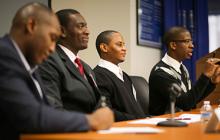Improving Outcomes for African American Males in the Child Welfare System (2011)
As Black History Month draws to a close it is even more important to continue to focus on the issues that face African American youth. Far too many African American males face disproportionate and disparate effects within the education, health care, juvenile justice and child welfare systems. In the United States, black children are four times more likely to be involved in the child welfare system than white children.1
AIR’s Human and Social Development Program (HSD) is a leader in the movement to reduce these disproportionate conditions and improve future outcomes for African American males. Last fall, the Technical Assistance Partnership (TAP) for Children’s Mental Health at AIR partnered with the Center for the Study of Social Policy (CSSP) through support from the Substance Abuse and Mental Health Services Administration (SAMHSA) and the Administration for Children, Youth and Families (ACYF) to convene a group of experts to address this pressing issue.
The meeting, held in Arlington, Virginia from September 22-23, 2011, brought together over fifty individuals representing the child welfare and mental health systems, researchers, policy makers, practitioners, and family and youth leaders from the national, state, and local level to discuss strategies for improving outcomes for African American males in the child welfare system.
The primary goals of the event, entitled Improving Outcomes for African American Males in the Child Welfare System, were
- to apply cutting-edge research to help participants gain a deeper understanding of the characteristics of African American males that are involved in the child welfare system;
- to describe the challenges African American males in the child welfare system often face; and
- to develop recommendations for improving outcomes for African American males in the child welfare system.
This meeting also represents ongoing efforts by AIR and HSD to further extend the reach of the African Heritage Learning Community that is part of the Cultural and Linguistic Competence Community of Practice within the Technical Assistance Partnership. A follow-up report summarizing the recommendations from the meeting will be released in Spring 2012.
February 24, 2012
12:00 AM - 12:00 AM ET
